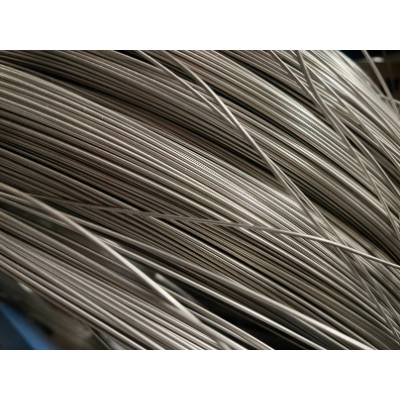Equivalence Stainless steel wire
In the previous post we discovered how to find out the equivalence of kilograms to meters of copper wire, in this one we will focus on finding out the equivalence of stainless steel wire and resolve some doubts that may arise when purchasing this product.
The stainless steel wire or stainless steel thread It is a material used by different industries such as decoration, construction, automotive, among many others. There are many doubts when buying a stainless steel wire, in this post we are going to resolve some doubts that our clients usually have.
Annealed, hard or semi-hard stainless steel wire?
We can find three types of thread when purchasing this product, and that can make us doubt which one is the most suitable for our work.
We can find 3 types of Stainless Steel Thread:

- Annealed Stainless Steel Wire, It is easier to handle since it can be molded and shapes can be made with it, which is why it is often used for jewelry design work or where the shape of the material needs to be modified.
hStainless steel ilo Duro it has greater firmness so it is more complicated to mold it if we want to make a precise figure, it is usually used to make fences or meshes.
Semi-hard stainless steel wire, It is malleable like annealed steel but a little harder and therefore more difficult to mould.
Equivalence of kilograms to meters of stainless steel wire
Once we know what type of wire we need to do the job we want, we may wonder how much we need to buy. Normally, copper wire is bought by the kilo, so we are going to find out very easily how many meters there are in a kilogram of stainless steel wire.
We will follow the following steps:
Choosing the Thread Size
The most important thing is to correctly choose the thickness of the thread that we want. At Zavala we recommend that you choose this size according to the work you are going to do. For more manual work such as creating jewelry, we recommend thinner sizes such as 0.6 or 1 millimeter. On the other hand, if you are going to do more industrial work such as mesh, choose sizes greater than 3 millimeters.
2. Find out how many kilograms there are in a meter
We need to know how many kilograms there are in one meter of the thread we want. But first we have to take into account that in order to calculate it we need to use the density of stainless steel which is normally 8.0 g/cm3, although there may be small variations depending on whether the wire is hard, annealed or semi-annealed. Therefore, the calculations will be approximate.
To find out how many kilograms there are in a meter of thread we will use the following formula:
(Thickness/2)2 x π x Density/1,000 = kg/m
Let's see this formula with an example so that we can see it more clearly. Let's imagine that we are interested in acquiring 1 millimeter stainless steel wire, so we will apply the formula:
(1/2)2 x 3.1416 x 8/1,000 = 0.006 kg/m
This result is the same as saying that in one meter of 1 millimeter stainless steel wire there are 0.006kg.
3. Rule of Three
Remember that our goal is to know how many meters we have in a kilogram of stainless steel wire, since this is normally the format in which it is purchased. To find this out we only have to apply a rule of three to the result found in step 2.
To make it clearer, we will use the previous example with the measurement of 1 millimeter of stainless steel wire. We saw that in one meter of wire there are 0.006 kg, so:
6 grams = 1 meter
1,000 grams = x meters
If we solve the rule x=1*1,000/6 the result is equal to x = 166 meters. So in a kilogram of 1 millimeter thread that we buy will correspond to approximately 166 meters of thread. You can apply this rule to any measurement you wish to purchase. Stainless steel thread.
At Zavala we have a wide variety of stainless steel threads that you can find on the web. Visit the official page of Zavala If you want to know more about us.

New Trends in Jewelry Design with Copper and Brass Wire: Ideas to Inspire Your Creativity


